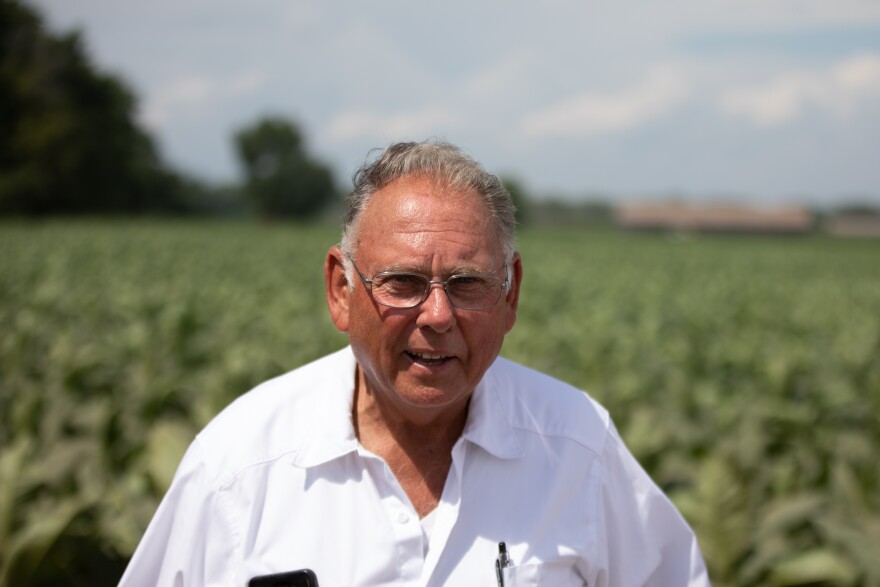A road that cuts through a dusty Connecticut farm bisects what could be the past and future of Connecticut farming. On one side is broadleaf tobacco, a staple crop of Connecticut farms for generations. On the other, delicate hemp plants, swaying in the July heat.
Eddie Kasheta owns this land in South Windsor. For decades, it’s been a spot where his family grew tobacco.
“When the grandparents started the farm, tobacco was king,” Kasheta said.
But times have changed. Kasheta said if farmers want to survive, they need to change with it.
“With the failing[s] of the market, and the up and down of the prices — and the economy — you’re forced to go into other ventures and try other things.”
Today, he’s watching as thousands of hemp plants go into the ground.
“There are so many uses,” Kasheta said. “Brake linings, sneakers. Rope. And then you have the hemp seed that they extract oil from.”
Hemp and marijuana are both types of cannabis. But hemp lacks the chemicals needed to produce a high. What hemp does have is cannabidiol, or CBD, a non-psychoactive chemical compound that has found advocates in both the wellness and medical industry.

According to a recent article in The New York Times, sales of CBD in the United States could be $16 billion by 2025.
Kasheta has partnered with Incredible Edibles, the latest business venture of Edible Arrangements founder Tariq Farid, which hopes to eventually use the CBD powder as an additive to drinks and baked goods.
Farmer Owen Jarmoc and his family started growing these as seedlings in a greenhouse just a few weeks back. They’re tiny, just a few inches tall. But, when the plants are ready for harvest in a few months, they’ll be several feet high.
Jarmoc said he’s worried about how they’ll do outside on the farm.
“There’s no consensus at all in the marketplace about how to grow this. What’s the best technique,” Jarmoc said.
That’s because for decades, it wasn’t legal to grow hemp. But the 2014 federal farm bill changed that, setting up a pilot program that allows farmers to grow hemp under strict conditions.
It took Connecticut a few years to set up its own pilot program. Governor Ned Lamont signed off on the idea in May. Since then, state Commissioner of Agriculture Bryan Hurlburt said the pilot program signed up 66 licensed growers.

“Hemp will be the new tobacco of a hundred years ago,” Hulburt said. “When every farm, or many farms, had five or ten acres of broadleaf tobacco, because it was a high-value cash crop. That was the crop that stabilized the rest of the farm operation.”
As part of the pilot program arrangement, UConn will send out field scientists to monitor the plants’ CBD levels and collect growing data, which it will make publicly available.
Shuresh Ghimire, an extension vegetable educator at UConn, said that information will provide guidance for farmers new to growing hemp. And that next year, farmers will know a lot more about the pitfalls to avoid when it comes to growing hemp.
“There will be problems, obviously,” Ghimire said. “It’s a field crop so there will be disease and insects.”

But in the meantime, Jarmoc said data collection will provide hemp producers like Incredible Edibles something else: traceability.
“It’s really important,” Jarmoc said. “You can go buy CBD right now all over the marketplace, but some of it doesn’t even have CBD in it.”
Ron Reynolds, with Incredible Edibles, said setting up traceability standards while researching hemp, and its potential uses in food, are two of the big reasons why his company wanted to get into the CBD market in Connecticut.
“Part of what were are doing here is humbly learning,” Reynolds said. “Because this plant, no matter what definition you want to use, has really not been around for about 80 to 100 years.”
Jarmoc said he’s hopeful the seedlings that went in the ground today do well. If they do, he said next year, they’ll plant some more.
But right now, Jarmoc said hemp in Connecticut is far from a sure bet. And the first true test for the state’s pilot program will be October, when these thousands of hemp plants will, hopefully, be ready for harvest.





